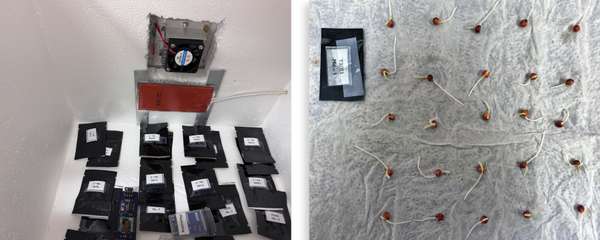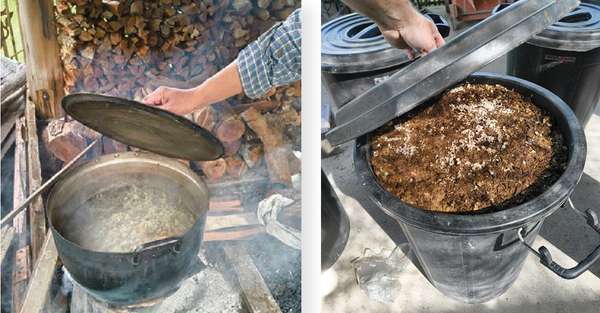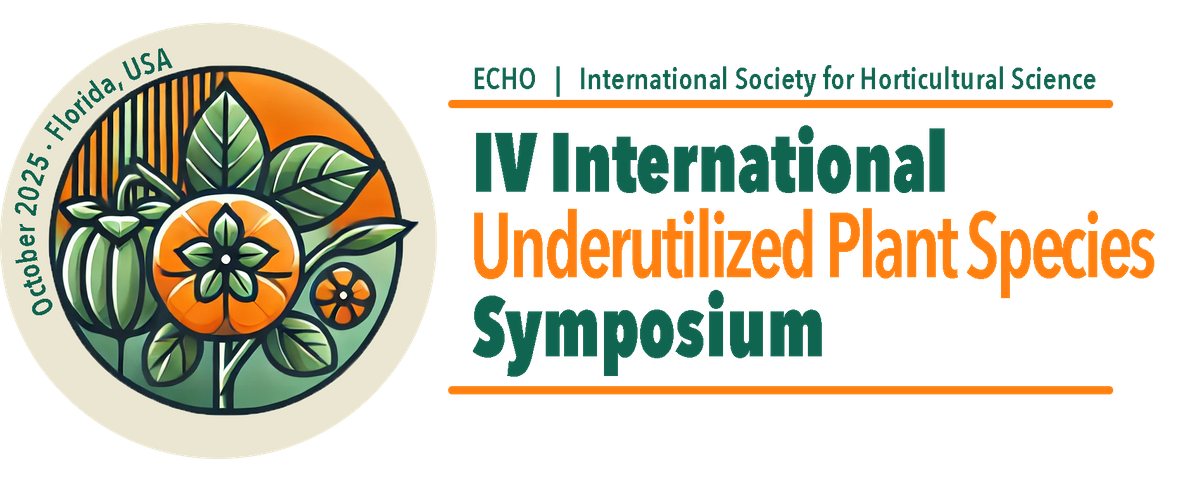Dear friends of ECHO,
Your interest and participation in research that benefits smallholder farmers is much appreciated. In this Research Newsletter, we will update you on a few research-related activities undertaken at ECHO and opportunities for engagement.
ECHO Research Updates
Seed storage temperature trial

Figure 1. Sorghum seeds in mylar packets in a temperature controlled box (left) to assess the importance of storage temperature on germination (right). Source Tim Motis
Seed moisture, as influenced by humidity of the surrounding air, is likely the most important factor in storing orthodox seeds. Orthodox seeds are those that can and should be stored dry. Less is known, however, about the importance of stable temperature. A trial at ECHO is underway that compares fluctuating temperature with stable warm and stable cool environments. Each of the three environments is created and maintained in a Styrofoam cooler.
- Fluctuating temperature: air is cooled with a peltier device and heated with mini 12-volt DC heating pads; these are turned on and off with timers to simulate cool night-time (10-12°C and warm day-time temperatures (31-32°C).
- Stable warm: air is heated with mini 12-volt DC heating pads regulated by a temperature controller to keep the temperature close to 31°C.
- Stable cool: the Styrofoam box is simply located in a room equipped with a window air-conditioner controlled with a CoolBot device.
The seeds are in mylar packets (5-mil thickness) to exclude humidity as a factor (Figure 1). The packets are sealed with and without vacuum. After one month of storage, we’re seeing over 90% germination of sorghum seeds regardless of treatment (temperature/vacuum combination). We’ll see what happens at month 3!
Processing of banana stalks for pig feed

Figure 2. Boiled (left) versus fermented (right) banana stalks. Source: Jonathan Ribich
Farm-generated livestock feed can offset the cost of commercial feed. Banana stalks (pseudostems), a rich source of fiber and minerals such as iron and potassium, are abundant in Thailand where they are often chopped, boiled (Figure 2), and mixed with other ingredients. Chopping and fermenting banana stalks is an alternative processing method that is less laborious than boiling and does not produce smoke, a common health concern in the region. A trial was undertaken at ECHO Asia to assess the cost effectiveness of raw, boiled, and fermented banana stalks over a 22-week period, the time it takes for pigs to reach marketable weight with on-farm feeds.
Over the course of the trial, there were no statistical differences in pigs' weight gain between the three banana stalk processing methods. Raw banana stalks require frequent gathering and chopping to avoid spoilage, whereas fermented banana stalks do not spoil as quickly and can therefore be gathered and processed in larger batches. Fermentation proved to be the most cost-effective processing method in the trial setting, where molasses and salt are inexpensive and readily available. See Issue 168 of ECHO Development Notes, for more details of costs and inputs.
Opportunities for Engagement
IV International Symposium on Underutilized Plant Species
We want to continue highlighting this event for those of you who are working with neglected and underutilized plant species. It will be held 20-24 October in Fort Myers, Florida, hosted by ECHO under the auspices of the International Society for Horticultural Science (ISHS). The ISHS webpage for the event, https://www.ishs.org/symposium/625, contains links for abstract submission and a link to the event website [https://underutilizedplants25.org/] with registration details. The deadline for abstract submission is 13 June 2025. Early-bird registration runs through the end of April 2025. Rates are discounted for ISHS members and students! Links for joining ISHS can be found on the event website as well.
Special journal issue on Agriculture and Faith
ECHO is assisting with the production of this special issue of the Accord Network journal, Christian Relief Development and Advocacy. Visit the Special Edition Website to find out more. There you will find a list of subtopics related to agriculture and faith, designed to stimulate ideas for writing. Submissions do not necessarily have to be research-oriented, as content can include discussion/opinion pieces and book reviews.
Knowledge Exchange
Trials that you may want to speak into
Below are a few research questions for which we would like to develop protocols for. Perhaps you have an idea for trials that development workers and/or farmers could readily implement.
- Does biochar impact crop yields in hoe-dug planting basins? We are considering a trial in Honduras that would compare biochar + bioliquid fertilizer to inorganic fertilizer. Perhaps you have ideas for charging biochar (e.g. amendments and timing for the loading of biochar pores with nutrients prior to applying it or planting), how much biochar to add to a planting station, particle size, and ways to assess biochar quality.
- Other than sending soil samples to a laboratory, are there alternative test kits or techniques for soil testing? With regards to the biochar question above, it would be good for farmers to know the pH of their soil before considering biochar, given that biochar often increases pH.
- What varieties of various crops are best suited for your area? Variety trials related to community seed banks. Let us know if you would like to explore methodologies for one or more crops you are interested in.
- What are some best cultivation practices for underutilized crops? There is surprisingly little information in published journals on this. Perhaps you would like to conduct a trial, for example on fertility, spacing, or pruning practices for a crop like Haitian Basket Vine (Trichostigma octandrum).
Best regards,
Tim Motis, Ph.D.
Tim Motis
Global Research and Publications Director
ECHO Inc.
To correspond with ideas and feedback about the topics of
this newsletter, email publishing@echonet.org.

